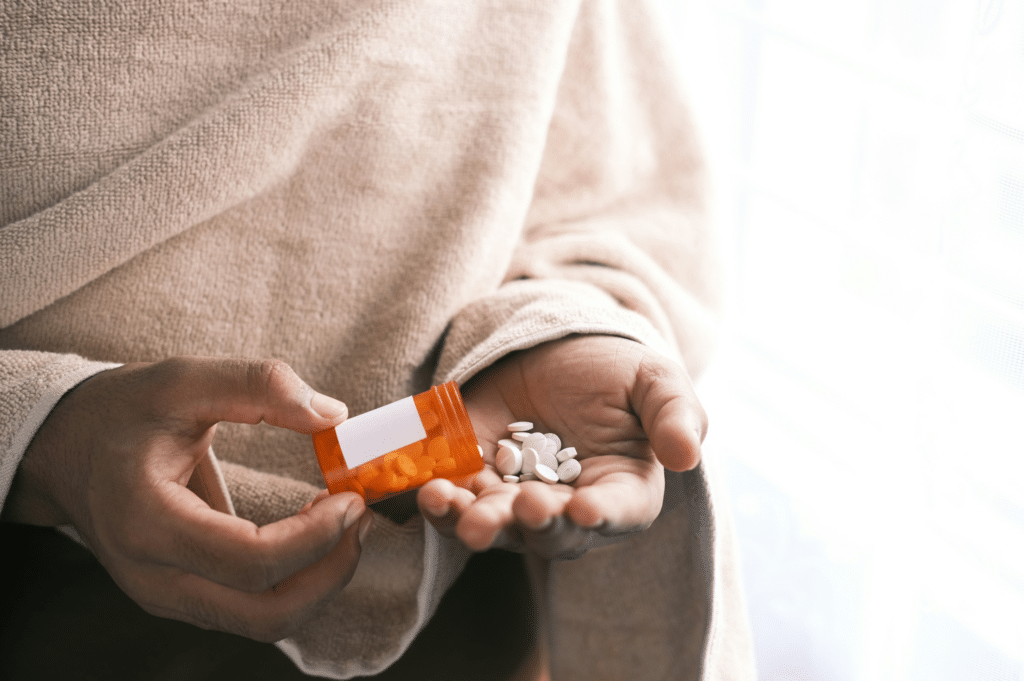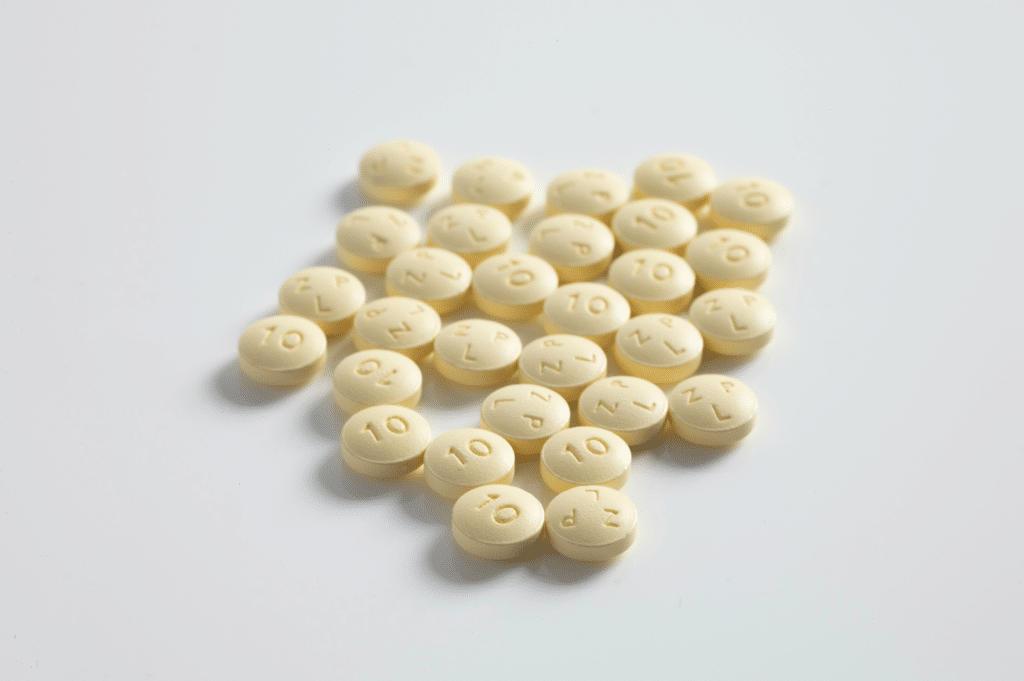Methadone and benzodiazepines are medications prescribed by doctors, yet they can be dangerous, both individually and especially if taken simultaneously. Methadone is the cornerstone of many successful medication-assisted treatment (MAT) programs. Many people credit methadone for helping them overcome addiction to opioid drugs.
Still, many people with substance use disorder also suffer from anxiety. Although doctors prescribe benzodiazepines to help treat anxiety and other conditions, there could be negative interactions for those taking methadone.

What Are Benzodiazepines?
Benzodiazepines, or “benzos,” are a class of psychoactive medications prescribed to manage the symptoms of a variety of conditions. There are several benzodiazepines on the market, all of which have a similar basic structure and act on specific neurotransmitters called GABA. By influencing activity at the GABA receptors, benzodiazepines create dramatic changes in the central nervous system (CNS). The CNS regulates heart rate, breathing, blood pressure and core temperature of the body. Benzos work to slow all these functions down.
Doctors prescribe benzos to manage very severe or sudden effects of anxiety caused by stress and overstimulation. They work very quickly to calm a person’s nerves within minutes. They can cause a feeling of euphoria when misused, however. As a short-term medication, they are relatively safe. Still, benzos are potent and can interfere with the brain and body to where they can cause dependence very quickly.
In a state of dependence, a person’s neurons adapt to frequent exposure to benzos. These adaptations result in a series of physiological reactions that make stopping the drug without medical assistance almost impossible. Some of the symptoms, like seizures, can be life-threatening. If a person doesn’t get help and continues to use benzos, addiction quickly sets in. Their use becomes more about avoiding withdrawal than it is about deriving a “high” from the medication.
Benzodiazepines have a considerable potential for misuse. Taking benzodiazepines while participating in methadone treatment is highly dangerous. It can lead to the possibility of developing an addiction to one or both medications. Learning the symptoms and side effects of each drug will help you understand just how dangerous it is to combine them. This concern is important to note when undergoing addiction treatment.

Side Effects of Benzodiazepines
Benzodiazepines can be dangerous even when taken according to a doctor’s prescription. The side effects of benzodiazepine usage may include:
- Tiredness and drowsiness
- Confusion
- Dizziness
- Trembling or shaking
- Impaired coordination
- Impaired vision
- Grogginess
- Depression
- Headaches
These symptoms are often mild at first, then increase with the dosage a person is taking. The symptoms are clearly indicative of how much benzos affect the nervous system. If a person’s use continues to escalate, damage to the central nervous system can become long-term.
How Methadone Works
Methadone has been an effective medication for decades to treat opioid addiction. As long as users take it as prescribed, methadone is highly effective and a safe option for treatment.
Methadone is itself an opioid medication, which is active on the same receptors as drugs like heroin and prescription painkillers. However, methadone’s window of action is longer than other opioids. Its effects are far more subdued than those of more powerful opioids when taken at a therapeutic dose, as prescribed.
For a person already dependent on opioids, methadone does not produce a high in prescribed doses. Instead, methadone creates just enough of an opioid effect to reduce cravings and prevent withdrawal symptoms from setting in. Methadone allows people to stabilize and participate fully in the rebuilding of their lives after opioid addiction.
Methadone is a controlled substance. Patients must visit a treatment center every day for their doses under clinical supervision for several months before becoming eligible for take-homes. Side effects of methadone include:
- Headaches
- Weight gain
- Stomach pain and cramps
- Dry mouth
- Tongue pain
- Flushed skin
- Difficulty with urination
- Changes in mood
- Vision problems
- Insomnia or disordered sleep

Reasons People Mix Methadone and Benzodiazepines
Despite the severe side effects that can occur with either medication, a surprising number of people mix methadone with benzos. Between 18% and 50% of patients receiving methadone in opioid treatment programs meet the criteria for dependence on benzodiazepines.
Combining the two drugs can lead to worse outcomes from treatment, and the combination also increases the risk of mortality. So why do people do it?
These are three of the reasons a person might mix methadone and benzos:
1. Lack of Knowledge
Many people don’t know combining methadone with benzos is dangerous in the first place. They may receive a prescription from a primary care physician who doesn’t realize the patient is on methadone. The provider can’t give appropriate guidance on possible repercussions in that case. This is why it’s essential to be completely transparent with providers about all currently used substances.
2. Desire to Get High
The mixture of benzodiazepines and methadone can produce a range of effects some people enjoy and seek out on purpose. A study found that about 45% of methadone patients with a history of benzodiazepine use reported they use benzos to “get high.”
Respondents also said that benzodiazepines enhance the effects of their daily dose of methadone. Heroin users reported that benzodiazepines extended the duration and intensity of the drug’s effect. Both of these actions can lead to a fatal overdose.
3. Physician Prescription
In few cases, a doctor overseeing methadone treatment will prescribe a benzodiazepine to address anxiety symptoms in a patient. If it does happen, patients receive only one or two doses in case of emergencies like a panic attack. However, taking benzodiazepines in combination with methadone even once can incite a persistent desire to misuse benzos, methadone or both.
Many individuals with a substance use disorder have co-occurring mental health disorders or issues. Depression and anxiety are among the most common. More so, they are often a part of the reason that a person used drugs in the first place.
Those individuals may have been prescribed benzodiazepines as a part of their treatment for anxiety or other mental health issues. While beginning treatment for substance use disorder, they will have to address the conflict between these medications with their physicians.
The Dangers of Mixing Methadone and Benzodiazepines
Surprisingly, there is little research on exactly how methadone and benzos interact. However, we see the danger of the combination in the number of associated overdoses. More than 30% of the people who died from an opioid overdose also tested positive for benzodiazepines. People taking both drugs are also at significantly higher risk of being admitted to the emergency room for drug-related care.
An overdose resulting in death is the worst possible outcome for someone taking both benzos and methadone. The risk worsens dramatically if a person is taking either or both medications outside of prescribed dosages. The symptoms of an overdose involving benzodiazepines and opioids mostly come from the sedative effects of both drugs. Their impact on an individual’s respiratory function could be potentially fatal. The symptoms are the same as those experienced when abusing either drug, but taken to their furthest extreme:
- Blurry vision
- Bluish color in nails and lips
- Confusion and disorientation
- Dizziness and light-headedness
- Impaired coordination
- Nausea
- Constricted pupils
- Slowed or stopped breathing
- Slurred speech
- Weakness
Without the proper intervention from emergency medical services, overdoses, including benzodiazepines and opioids such as methadone, can be fatal. While it’s possible to reverse an opioid overdose using naloxone, this medication does not affect the component caused by benzodiazepines. It may not be able to save a person’s life if they have combined benzos and methadone.

How Benzodiazepines Affect Methadone Retention
Another concern about mixing benzos and methadone is how the combination affects treatment retention. Do those who take benzos have a lesser chance of completing treatment? According to a study in the Journal of Addiction Medicine, the combination of medicines might not affect treatment retention. As long as users take both medications as prescribed, they should be okay.
The study followed patients in 52 different opioid treatment centers who were starting MAT with methadone. They were also taking prescription benzodiazepines, non-prescribed benzodiazepines, or no benzodiazepines at all. The study followed patients through their discontinuation of treatment, death, or one-year follow-up. The researchers used the results of urine drug screens and prescribing information from health records.
The primary outcome of the study showed patients who were using non-prescribed benzodiazepines were much more likely to discontinue their methadone treatment. Participants not taking benzodiazepines or taking benzodiazepines as prescribed stayed in treatment.
Can People on Benzodiazepines Start Methadone Treatment?
Given the known and unknown risks of combining benzos with methadone, difficult medical choices are at stake. What should people on benzodiazepines do if they need addiction treatment?
In 2017, the Food and Drug Administration (FDA) clarified its guidelines on benzos and opioid addiction medications such as methadone. They recommend that treatment professionals shouldn’t withhold methadone from patients who are taking benzos or other CNS depressants.
The damage done by an untreated opioid addiction outweighs the risk of harmful side effects of mixing the drugs. If a doctor co-prescribes methadone and benzodiazepines, they can control and adjust dosages to reduce unnecessary risks.

Is Suboxone a Better Option?
Although methadone treatment has been successful for many people over many decades, the problem of its potential for misuse remains. It also makes concurrent benzodiazepine use more dangerous in terms of developing an addiction to either medication.
For patients currently prescribed benzos, Suboxone may be a more appropriate option. Suboxone is a prescription medication approved for use in MAT in 2002. It contains two active ingredients.
- Buprenorphine: A partial opioid antagonist that helps relieve cravings and withdrawal symptoms by blocking the brain’s opioid receptors
- Naloxone: An opioid antagonist that blocks the effects of the opioid itself
Suboxone can address the potential for addiction by incorporating naloxone as a deterrent. The naloxone only activates when someone attempts to abuse the medication by injecting it. Upon injection, the naloxone in Suboxone produces immediate withdrawal symptoms, including headache, sweating, restlessness, nausea and vomiting.
Additionally, naloxone makes it impossible for the individual to stop the withdrawal symptoms using another opioid drug.
This powerful deterrent makes it almost impossible for someone to abuse Suboxone. This is a crucial feature for those taking another potentially addictive medication like benzodiazepines.
Opioid Addiction Treatment at AppleGate Recovery
If you are struggling with opioid addiction as well as dependence on benzodiazepines, you may be thinking about treatment. Benzos will not interfere with opioid treatment if you work with a network of specialized providers to coordinate your care. They will prescribe appropriate amounts of benzodiazepines and potentially taper you off the medication altogether.
AppleGate Recovery is proud to provide medication-assisted treatment with Suboxone and other buprenorphine compounds. Our dedicated team of physicians and other addiction treatment professionals provides individualized treatment plans. These dynamic programs will give you or your loved one the tools and support necessary to overcome opioid addiction. To learn more about the next steps, our locations and what AppleGate Recovery can do for you, call us at 888-488-5337 or contact us online.
